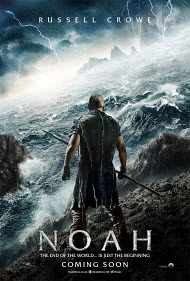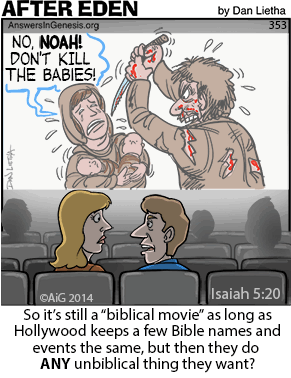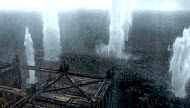Noah
 for violence, disturbing images and brief suggestive content.
for violence, disturbing images and brief suggestive content.
Reviewed by: David Criswell, Ph.D.
CONTRIBUTOR
| Moral Rating: | Extremely Offensive |
| Moviemaking Quality: |
|
| Primary Audience: | Adults Teens |
| Genre: | Action Fantasy |
| Length: | 2 hr. 18 min. |
| Year of Release: | 2014 |
| USA Release: |
March 27, 2014 (wide—3,400+ theaters) DVD: July 29, 2014 |






About THE FALL OF MANKIND to worldwide depravity
What kind of world would you create?

 The true Genesis Flood
The true Genesis FloodThe Biblical account of the Flood
Motion picture segment about the Flood (from The HOPE)

Could Noah's Ark really hold all the animals preserved in the Flood?
Why has the Garden of Eden never been found?

How did various animals get from the Ark to isolated places, such as Australia?
 How did FISH survive the worldwide Flood? both freshwater and saltwater types?
How did FISH survive the worldwide Flood? both freshwater and saltwater types?
How did LAND PLANTS survive the Flood?
Did Noah need oxygen above the mountains?

Genesis and ancient Near Eastern stories of Creation and the Flood: an introduction.

Where are all the human fossils?
What is FAITH and why is it important?
Was there a thick water vapor canopy in the pre-Flood world?
How do we know the Bible is true?
INFALLIBILITY—How can the Bible be infallible if it is written by fallible humans?
Answers to supposed Bible “contradictions” and puzzles
Is the Bible truth or tabloid?
| Featuring |
|---|
|
Russell Crowe … Noah Emma Watson … Ila Jennifer Connelly … Naameh Logan Lerman … Ham Douglas Booth … Shem Anthony Hopkins … Methuselah Kevin Durand … Og Marton Csokas … Lamech Ray Winstone … Tubal Cain Sami Gayle … Sami Nick Nolte … Samyaza Frank Langella … Azazel See all » |
| Director |
| Darren Aronofsky — “Black Swan” |
| Producer |
|
Paramount Pictures Regency Enterprises See all » |
| Distributor |
“It’s a very, very different movie. Anything you’re expecting, you’re f***ing wrong.” These are the words of director Darren Aronofsky and they pretty much sum up the film. It is “different” from the Bible in almost every way, and it is “f***ing” disrespectful to those of us who are “expecting” a movie about the Biblical Noah.
First, let me review the film ascetically from a purely secular standpoint. Was it a good film without regard for its Biblical authenticity? Frankly, it was not. Aronofsky is known for his dark and depressing films, and “Noah” is no exception. The film has a dark brooding and violent tone from beginning to end. The “redeeming” quality of the film is muted by Aronofsky’s obsession with melancholy brooding. Even if I did not believe the Bible to be the Word of God, I would find this film unpleasant and only moderately entertaining.
The story itself, owing little to the Bible, is a mixture of myth, fantasy, and drama. Noah is troubled by visions and pieces together that the world will be flooded. He seeks to save his family from the coming Flood, but is attacked by the tribal king who eventually stows away aboard the Ark. Noah, believing that mankind must die out, plots to kill his grand-daughters and insure that his children never breed. The film climaxes with a battle aboard the Ark between Tubal-Cain and Noah, while Shem’s wife gives birth to twin daughters whom Noah plans to kill. Will Noah keep his promise to God to kill the girls?
In case you hadn’t figured it out yet, this is “the least Biblical Bible film ever,” as Aronofsky himself has stated. Herein lies the greatest problem. If he wanted to make a fantasy film about the antediluvian age, then he would have been better served making a film about Gilgamesh or Satyavarman (the Hindu version). Since virtually every culture contains a Flood story (because it really happened), this would have been better, for the film has almost no relation to the Biblical Noah at all. However, since the film was billed as a Biblical movie, the outright anti-Biblical, and even Luciferic, derivations are important to understand. To save space I will only comment on the most important alterations.
Luciferism
Undoubtably the most bizarre addition to the Bible is the now trendy Luciferism subplot. For those who are not familiar with this now cliché plot point, Luciferism is when rebellion against our Creator is portrayed as noble or sympathic in nature. In this case, this is literally true. The Watchers (the name given to demons in the Book of Enoch and this film) “wanted to help man” because they “took pity on them,” but God cast them out for disobeying his orders.
I remember the scene in the trailer where Tubal-Cain says to Noah “you stand alone and defy me,” and Noah replied “I am not alone.” The audience cheered, thinking that Noah was referring to God, but alas he was not. When he said “I am not alone,” the Watchers (demons) arose to help him. It is not God, but demons, to whom Noah was referring. These Watchers then help Noah build the Ark and die defending the Ark from Tubal-Cain. Apparently the demons are redeemed as their souls go up to Heaven.
This is not the only Luciferism in the film, however. There is a large amount of imagery of the serpent which shed his skin in the Garden. That skin was then passed down to Noah who uses the snake skin in several strange rituals. In other scenes, hundreds (if not thousands) of snakes are seen crawling aboard the Ark. Finally, Noah himself is a Lucifer symbol, because when he refuses to kill his grand-daughters in the climax of the film, he is portrayed as defying God’s will (or at least he believes he is defying God).
Luciferism is thus a dominant plot point throughout the film and completely at odds with the Bible. In this film, DEMONS are sympathetic, but God is not so much sympathetic. He is a distant impersonal God who never once speaks to Noah.
“Woe unto them that call evil good, and good evil; that put darkness for light, and light for darkness; that put bitter for sweet, and sweet for bitter!” (Isaiah 5:20 KJV)
Genocide and Patricide

As I mentioned earlier, part of the subplot of the film involves Noah’s desire to see the human race extinct. To that end, he plans to kill his own grand-daughters. Naturally, his sons want to defend their daughters/sisters. Both Shem and Ham attempt to kill Noah aboard the Ark at one point in the film. This bizarre subplot is supposed to highlight the question of whether or not man is “worth saving,” but this very question is a secular one. God saves us because He loves us; not because we deserve to be saved. It is then ironic that Noah is portrayed as a borderline psychopath who deserves to be saved because there is goodness in his heart, somewhere.
Environmentalism
Aronofsky calls Noah the “first [radical] environmentalist.” That environmentalism is not only apparent throughout the film, but extreme and inaccurate. Contrary to the Biblical picture (and one supported by science) of a plush world, Aronofsky shows the Earth as barren desert and rock, having been destroyed by man. When Noah gives the Creation story to his children, he says “our fragile Earth was born.” Indeed, this is how radical environmentalists see the Earth—fragile. In fact, while we are to care for the Earth which was entrusted to us, God did not make the Earth some fragile paper mâché world. It has survived catastrophes like… a global Flood!
EARTH’S ENVIRONMENT—Should Christians be concerned about the environment? Answer
What is man’s responsibility to the environment? Answer
Biblical accuracies and inaccuracies
Aside from the major problems listed above, there are countless inaccuracies. Ham wanders off alone without a wife; the animals are put to sleep in the Ark; the animals are not two by two and boarded together; Methuselah is portrayed as Shaman; only Shem has a wife; etc. The list of inaccuracies is too long to list here. It is easier to portray what was accurate. First, there is a guy called Noah. He builds an Ark with animals. The fountains of the deep accompany the rain waters and hurricanes are seen encompassing the Earth. Most everything else has no relationship to the Bible, at all.
Moral cosntent
“Noah” is a violent film. There are numerous scenes of blood and warfare and several animals have their throats slits or stomachs cut open. Blood splatters on Ham in one scene, and in another a dead animal’s insides spray out on a mass of people who are killing one another and raping countless women (no graphic sex or nudity is shown). In addition to this, there is some brief nudity as Noah’s drunkenness is shown; it may be a body-double, the camera is far off and does not focus on his behind. The viewer should also be aware that there is a lot of magic and mysticism in the film, which I only briefly touched upon above.
Supporting “Christian” films?
A lot has been said about this movie. Russell Crowe even went so far as to call people like Ken Ham “stupid” for commenting on a film he claims they haven’t seen. Well, I have seen it, and Ken Ham’s warnings are mild, as I was not prepared for the overt Luciferism.
Two questions remain. First, does Hollywood need a tutorial in how to market films? Insulting your target audience, as was done throughout the promotions, is not a good marketing strategy. Know your audience. We are not fools. Evangelics have an average of two more years of college than the average person. If you want to market to us, understand us, don’t talk down to us, and don’t insult us. More importantly, don’t hire an atheist to make Biblical films.
The second question is whether or not we should “support” films of this kind. Some Christians have argued that this is a good thing. They say that it is an opportunity to talk about the Bible and that if we don’t support films like this Hollywood will not make them anymore. To the second part, I say, please don’t. It is better not to have a “Bible film,” if the Bible is just going to be mocked. To the first part, I say that we do not have to like or support an un-Biblical “Biblical film” to talk about it. We can talk about it without supporting it. If we support it, then we are supporting its message, and its message is not a Biblical one.
Final analysis
In the final analysis, Noah is a huge waste of $160,000,000. The special effects are not bad, but the Watchers are frankly silly looking. I was somewhat reminded of the Tree Ents from “The Lord of the Rings,” but vastly inferior. Moreover the film gives the impression that the world was a barren desert, and there seemed to be only a small population of a few thousand people led by Tubal-Cain. It seemed to me that if one wanted to make a story about the ante-diluvian world (even from a secular perspective), the story could have been ripe with richness. Instead, I felt like I was watching cave men fighting rock giants on a deserted alien planet. I recommend that families stay home and avoid this film.
Violence: Heavy / Profanity: None / Sex/Nudity: Moderate
ALSO, see informed review from our ChristianAnswers team member Answers In Genesis:
• “Noah Movie Review: An Unbiblical Film”
See list of Relevant Issues—questions-and-answers.

Who was the real…?
Frequently asked questions
 Where did the Flood water come from? Answer (How could there have been enough water to cover the entire Earth?)
Where did the Flood water come from? Answer (How could there have been enough water to cover the entire Earth?)- Where did the Flood water go afterwards? Answer (If the whole Earth was deeply flooded, where did all that water go after the Flood?)
- Was the Flood local or global—covering the entire Earth? Answer (discover 9 Biblical evidences that the Flood was global)
- How many people survived the Flood catastrophe? Answer
Watch ChristianAnswers’s award-winning film about the reality of Noah’s Flood


Moral rating: Better than Average / Moviemaking quality: 4½
Moral rating: Good / Moviemaking quality: 5
Moral rating: Better than Average / Moviemaking quality: 4½
Moral rating: Average / Moviemaking quality: 5
Moral rating: Excellent! / Moviemaking quality: 5
Yet textual accuracy is not this movie’s main drive. Therefore we get a mishmash of non-accurate situations as well as some accuracy in emotions and feeling.See all »
Moral rating: Offensive / Moviemaking quality: 4
Although the producers, to their credit, did depict the original sin, however, there was a ceremonial arm wrapping with a snake skin that I didn’t quite understand. If you just have to see this film in the theater on the big screen at least read the TRUE story in Genesis 7 to 9 first. They might as well have called this Noah “the mariner’s brother”. I would highly recommend that you see a film like “God’s Not Dead” if you haven’t yet, instead of supporting “Noah”. See all »
Moral rating: Extremely Offensive / Moviemaking quality: 5
I can’t endorse the movie as anything Biblically accurate, but Christians should find some curious things here to ponder, and this is great food for conversation, as well as a gateway to share the Gospel. Now I went in expecting to hate this film, and I did not. I did not appreciate the merger of Bible and mythology, and I perceived the evolutionary and hyper-environmental messages that were flowing through, but some of the creative license taken was thought-provoking, and everyone running to their Bibles was a fairly positive outcome to this confused (even if deliberately so) work. See all »
Moral rating: Better than Average / Moviemaking quality: 4½
Moral rating: Extremely Offensive / Moviemaking quality: 3
If this were a film about Mohammad or the Koran in any form, there would be massive riots and possibly worse. Why is it OK to have “poetic license” with what is holy? It’s not!
Moral rating: Extremely Offensive / Moviemaking quality: 2
Moral rating: Extremely Offensive / Moviemaking quality: 1
What concerns me is how it negatively portrayed God, who is never called God in the film, but the Creator, how it positively showed demons, fallen angels called watchers in the film, and depicted Noah as a man who is bent on wiping out all of mankind, including his very own family, going so far as threatening to kill his own grandchildren, should they be girls.
I would definitely recommend that you not see this film. Save your money and go instead to films such as “Son of God” and “God’s Not Dead,” which to me are more Biblically accurate and glorify God.
Moral rating: Extremely Offensive / Moviemaking quality: ½
Noah is portrayed, not as a righteous man who walked with God, but as a murderous maniac chosen to “save the innocents: the animals.” Noah wants to help The Creator wipe out mankind, including his own family, and leave Earth for the animals.
Sad, because of what this movie could’ve been. For example, Anthony Hopkins creates an interesting, likeable character as Noah’s grandfather, Methuselah. Biblically, because Adam and others were alive while he was growing up, Methuselah likely knew Adam and may have recounted Adam’s direct account of events in the Garden and the Fall to Noah and his family. Instead this movie about Noah is a mockery. Tragic because of the people who may see this movie and think that is what is in the Bible. Made me think of Matthew 24:37-39 and 2 Peter 3:3.
Moral rating: Extremely Offensive / Moviemaking quality: 3
I have watched Bible-themed Hollywood films that have had some problems with them, they still could be used as conversation starters for evangelism. But I can’t say that for “Noah”—the problems are such that the film could be counterproductive for non-Christians to watch.”
Okay, the acting was so-so, and the special effects were interesting and at times impressive. But the storyline? It was like someone was in a drug-induced state when they wrote the script. “Rock-transformer giants” who fight the “men” and then who self destruct and beam their way back to Heaven? (Seriously, you can’t make this stuff up, folks.) Wow! …Please, make it stop! Save your money for something else. Or donate what you would have spent on this movie and give it to a worthy cause.
Moral rating: Better than Average / Moviemaking quality: 4
Moral rating: Offensive / Moviemaking quality: 2½
From a biblical viewpoint Noah himself is about as far away from the Noah of the Bible as he could get. Perhaps the best way to describe him and what he does in the movie would be to liken it to Hollywood doing a movie about Napoleon, and portraying him as a tall Japanese-speaking crocodile hunter, who was into sky-diving and Russian roulette.
However, there's something more sinister about the production of this movie. It's more than just a grown man with a childish imagination playing with an expensive toy. It is the blatant mischaracterization of a man of God in an attempt to undermine the authority of the Word of God.
If Hollywood's “Noah” is a financial success, I suspect that a sequel will be a blasphemous mischaracterization of Jesus and His work on the cross. As with “Noah,” this will be given a pass by many professing Church leaders who are mesmerized by the glitter of Hollywood. These are dark times indeed.
Yet my fading hope is that if Hollywood ever sees fit to portray another biblical figure, they will get it right. They can have their poetic licence, but they must stay faithful to the script revealed in the Scriptures. If they do that, I will encourage Christians everywhere to flood the theaters, and I'm sure I'm not alone in that conviction.
In the meanwhile, I am encouraged that over 150,000 people freely saw our version of “Noah” in just over two days since its recent release. May those who have a “Noah” craving, get their fix at NoahTheMovie.com
Since the distribution company wouldn’t allow us to preview the movie in advance, I figured it was going to be unbiblical and didn’t want us to write a bad review. Because I expected it to be unbiblical, I invited my pastor to attend with me to make certain I didn’t take anything out of context or miss some key biblical point.
What I didn’t expect was how absolutely boringly bad this movie would be. I kept thinking, as I continually checked my watch, I’ll never get that 5 minutes back, or That 5 minutes, or THAT 5 minutes. This checking of my watch went on for more than 2 hours!!! Counting the previews, that’s nearly 3 hours that I’ll never have back.See all »
Also, it had Noah’s sons turning on him and trying to kill him on the ark. Also, had one point in the film where 2 little girls where born to his son and Noah was going to kill them… Terrible Film. And there are so many other things that were put in the film that just never happened. Please open up the Bible and see the true story.
Moral rating: Average / Moviemaking quality: 5
The skin of the serpent who tempts Eve to eat of the forbidden fruit is depicted as a symbol of reverence throughout the movie. The Watchers, giant, rock-like creatures who were once angels that were thrown from Heaven for disobeying God, are depicted as the protectors of men who are “misunderstood” by God and then taken back to Heaven in the end.
Furthermore, after the flood recedes, Ham takes off alone, still angry with his father for not allowing him to take a wife, leaving Noah to preside over a broken family. There is no evidence of this whatsoever in the Bible. All three of Noah’s sons had wives before they entered the ark. Would that be God’s plan for the only remaining human beings after He destroys mankind? It could be if it was God’s intention to leave the Earth to the animals alone, since man didn’t appreciate the environment, which was another underlying theme in the movie.
Lucifer rebelled against God to assert his own will. So did man. I got the impression from this movie that that isn’t necessarily a bad thing, and that abusing the environment and not protecting God’s creatures is worse. If that was true, then there would have been no need for Christ to come into the world to save us. How convenient for the atheist who wrote and directed the film. Don’t see this movie.
Moral rating: Extremely Offensive / Moviemaking quality: 3
1) The biggest problem with this movie, literally and figuratively, are these fictional things referred to in the movie as “the Watchers.” Here’s their mythology: According to the movie “Noah,” after the Fall, some “angels” were worried for the plight of man and decided to “help” them. Because those “angels” went against the wishes of God, he cast them out of Heaven… which look like meteors falling from the sky. They became “fallen angels” cursed to take the form of rocks, they became known to man as “the Watchers;” so these giant rock monster-like beings with burning coal-like cores taught mankind “all they knew,” but mankind turned on them and killed all but a few who ran and hid and begged God to return home. See all »
Moral rating: Extremely Offensive / Moviemaking quality: 2
Noah, the main character, interestingly is more concerned with preserving the life of the “innocent” animals than that of Mankind. Hence, the scene where he watches two young girls being pulled away to be sold into slavery or raped is overshadowed with his appalled expression at the misuse of animals as they are butchered and eaten. Biblically, after the flood, God gave Noah animals to be eaten as food.
For any Christian out there who is considering viewing this movie, I would not recommend doing so unless one of your favorite past times is hanging out in witch covens—that’s how DEMONIC this movie is!
Moral rating: Extremely Offensive / Moviemaking quality: ½
Moral rating: Extremely Offensive / Moviemaking quality: 3
Moral rating: Extremely Offensive / Moviemaking quality: ½
Tubal-Cain turning the film blasphemous by inferring that having dominion over the Earth is the foundation of sin. It’s stated that the animals act exactly the same now as in the garden of Eden, which they do not, they didn’t eat each other in the garden. The first sign of the waters receding was the ark bashing into a rocky outcrop. Like was previously pointed out, there just isn’t enough room here to point out all of the inaccuracies.
Moral rating: Very Offensive / Moviemaking quality: 3½
Moral rating: Offensive / Moviemaking quality: 2
I have learned that I will NOT see movies made from Hollywood until it has been out long enough to get reviews. I felt guilty even watching it and when I left, I saw the other movie being offered, “God’s Not Dead,” I sure wish I would have seen that one. I urge you to not see this movie, you will regret corrupting your spirit and mind if you do, I sure wish I had been more diligent to investigate it before watching. It is a warning to us all, as Hollywood gets more involved in making movies about the Bible, that we make sure they are accurate before we even consider watching them.
Moral rating: Extremely Offensive / Moviemaking quality: ½
It is plain to see how late the hour is, how deep the deception has become. We all know who runs the mainstream movie business so I guess we shouldn’t have expected anything different. I regret spending money on this film—I never want to support this kind of thing again.
Moral rating: Extremely Offensive / Moviemaking quality: 2
The first reaction that came to mind from watching the movie “Noah” was wondering how Noah could have gotten everything so correct at the beginning, only to become so astonishingly wrong at the end. He was brilliant as the servant who carried out God’s inspired mission of creating a great ark all ready for pairs of the world’s animals to come aboard in preparation for the deluge, but then he degenerated into just another one of corrupt hoi poloi (which we may recall was God’s problem with his creation in the first place). The Noah of this namesake movie forgot that God chose him for this momentous task because he was found to have been “righteous in his generations. But, near the end of the movie Noah declared that he had failed in his mission from God. That’s like Columbus declaring that he failed in his mission because he never found the short route to Cipangu.See all »
Moral rating: Very Offensive / Moviemaking quality: ½
Also, in the movie, Noah had no direct communication with God. The movie depicted Noah as being very confused and led by dreams and by his grandfather. After the family entered the ark, Noah (knowing that Ham and Japheth had no wives and Shem’s wife was barren) was led to believe that God wanted all of mankind to die, including Noah and his family. When they learn that Shem’s wife is actually pregnant, Noah sets out to murder the babies born to Shem on the ark. The Bible tells us that “Noah, his wife, his sons and his sons’ wives, entered the ark”.
In the end of the movie, Ham wanders off to Canaan with no wife, yet in the Bible, Ham is the father of Canaan.
…Don’t even get me started on the rock monsters, fallen angels who helped build the ark and save Noah’s family. Just sickening how far from the truth this movie is. The movie did not even touch on the rainbow of God’s covenant with man.
Moral rating: Extremely Offensive / Moviemaking quality: 2½
The story was changed, and my worry is that young people who have not read the story of Noah will go away with the idea that God is not good. I hope that they will read the Bible and see the differences and realize that the tale was certainly changed from the original.See all »
Moral rating: Offensive / Moviemaking quality: 5
Moral rating: Extremely Offensive / Moviemaking quality: ½
If the producers wanted to make a blockbuster they should have followed the story line and emphasized on the drama of Noah being hit with the reality of a worldwide flood. They tried here but failed. Making Noah more true to his real character in the Bible where he loves people and hurts for those who are all going to die would have added to that drama in a very suspenseful way. Along with Noah having a real person issue like wondering how God was going to fill the ark, only to witness the miracle in disbelief. Another drama builder. This was nothing more than a storyline yanked from it’s context to try and create a story that is not very interesting outside of that context. Angels becoming rock people, animals that tell an Evolution story, etc. Great actors, great cinematography, and one big missed opportunity.
Moral rating: Offensive / Moviemaking quality: 4
I knew going into the movie that it wasn’t going to follow the Bible. The only similarities to the Bible is that there was a guy named Noah who floated on a boat. That’s about it! Nothing else was really biblical! I really think the character Noah ended up being a psychopath who needed a smack in the face!! It was dumb, stupid, and horrible! Don’t even rent it… not worth your time or $$!!! What a disappointing movie to see on my birthday!!…
Moral rating: Extremely Offensive / Moviemaking quality: 4
Stone transformers? What was that about? They even had flares! A lot of the film was taken up by Ham wanting a wife. But all Noah’s son’s had wives when they entered the ark (Genesis 7 verse 13).
The Bible doesn’t say much about Methuselah but this film has him as some kind of Lord of the Rings wizard! And to use a snake skin as something that gives power from God is mad, seeing the serpent was evil. The whole film is warped!
The Bible has very deep spiritual meanings, and man corrupts it to suit himself. Just like this man has twisted God’s Word to make a profit. See all »
Moral rating: Extremely Offensive / Moviemaking quality: ½
There’s no need to retell all of the outrageous inaccuracies that have been stated before. I don’t recall any film in the past that has taken such liberties with a biblical story. A more accurate title to the film would have been “NOT NOAH.”
Moral rating: Offensive / Moviemaking quality: 2
Don’t waste your time or money on this film. The ONLY thing they got right were the names of most of the characters and even if I weren’t a believer, it’s still a terrible movie.
Moral rating: Offensive / Moviemaking quality: 3
Later on in the movie it pictures Noah as some deranged prophet about to murder his own family! This movie made me hate Noah as depicted in it. In the Bible we read about him as a compassionate, obedient, full-of-faith prophet of God who loved his family and was used by God to save humanity.
There is a warning in the Bible for the producers of this movie: “And whosoever shall offend one of these little ones that believe in me, it is better for him that a millstone were hanged about his neck, and he were cast into the sea.” Mark 9:42
Moral rating: Extremely Offensive / Moviemaking quality: 3
While filming in Iceland, it was stated that “daily offerings were made to the Icelandic elves so as not to disrupt production.” Filmmaker Mr. Aronofsky stated that he wanted to show “respect” to these elves, if they were around. What else needs be said. Save your money and time on this one-it’s not worth it.
Moral rating: Extremely Offensive / Moviemaking quality: 4
Overall, after viewing the movie two times, I give this a low rating of 2 stars. If you want to see a good Hollywood take on the Bible, I would suggest “Exodus: God’s and Kings.” It’s not accurate, but a more faithful movie than this. “Noah,” in my opinion, should be avoided at all cost.
Moral rating: Extremely Offensive / Moviemaking quality: 2½
Moral rating: Extremely Offensive / Moviemaking quality: ½
Moral rating: Excellent! / Moviemaking quality: 3½
PLEASE share your observations and insights to be posted here.
It is astounding to me how Christians can be lured into a defense of the indefensible because they are so afraid of the charge of “unreasonableness.” Trying so hard to be nice, we end up being patsies for people who have no other agenda than to make money off of us. …
“VOTING” FOR BAD MOVIES—Every time you buy a movie ticket or rent a video you are casting a vote telling Hollywood “That’s what I want.” Why does Hollywood continue to promote anti-Biblical programming? Are YOU part of the problem?
This movie and the motives behind it are a dishonour to God and an insult to the committed Christian. Those of us who see it are doing no more than supporting the enemy as he works to destroy as many as he is able.
Very disappointed that some self proclaiming Christians are falling into a world view that it's ok to disrespect our God and his word. “It's just a movie.” No everything we do and watch and say needs to be carefully examined! Because the world is watching what we do as Christians. We should stay away from these false accounts and fill our time and spend our money on better (Christian value) entertainment. Be either hot or cold! Not a Luke warm Christian!
Oh yeah! Demons kill steal and destroy, they don't and did not help Noah, God was the only one that helped Noah remember! Someone please send the director a Holy Bible please! Thanksss!
If we were another religion, our President would have major problems right now with riots in the streets of every major city due to this film, because it is an affront to our God. As for me and my house, we will serve the Lord. The McClure Family—Ohio


Noah isn’t perfect. He isn’t the saintly man we want to remember from Sunday School. He misreads God in a big way in the second half, leading him to struggle with his belief that none of them are righteous enough to live. He takes “innocent life” in his hands with the intention of killing it—and can’t, because in that moment, all he feels is an incredible, overwhelming love—a lot like the love that redeems us from our depravity (both a pro-life statement, and a reflection of God’s desire to save us from the punishment we deserve; Noah isn’t defying God, he’s being humbled to the point where he realizes that no, he isn’t good enough to be saved on his own… he needs mercy; he’s also, in a small way, representative of God choosing to let humanity live). See all »
My Ratings: Moral rating: Average / Moviemaking quality: 4½